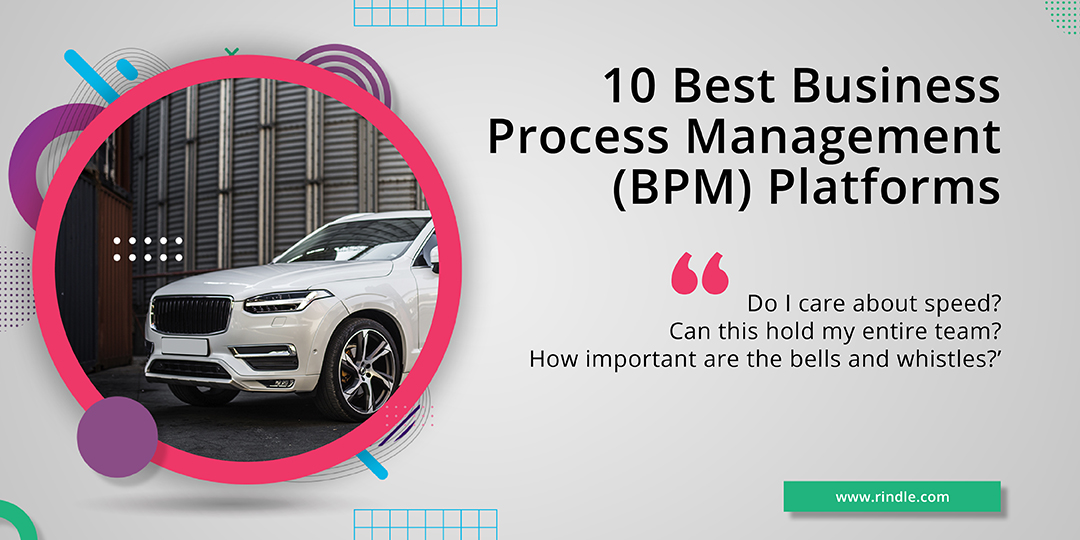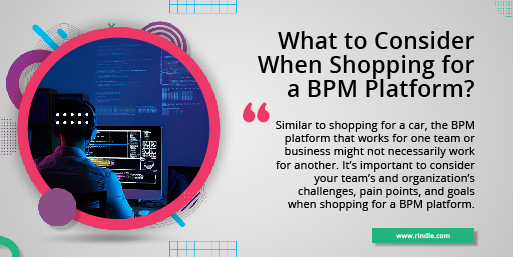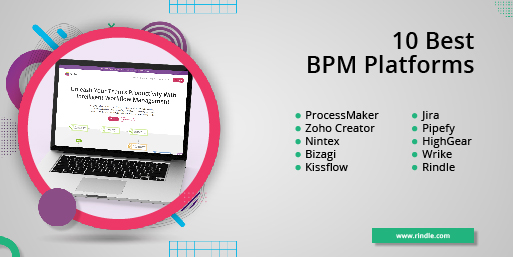Process & Workflow
10 Best Business Process Management (BPM) Platforms

Implementing a new tool into your team’s workflow to improve your internal processes can be as stressful as shopping for a new car.
There’s always an overwhelming number of options all claiming to be the best. So what do you do? You shop around, take a few complimentary test drives, and still have unanswered questions.
Do I care about speed?
Can this hold my entire team?
How important are the bells and whistles?
And after a very frustrating day of shopping, you relentlessly ask yourself, ‘Do I even need a new one?’
Like purchasing a new car, it’s important to ask these types of questions before adopting a new business process management tool.
In this article, we will discuss what a business process management platform is, why your business needs one, and some great tools to consider.
What is Business Process Management?

Business process management (BPM) involves implementing processes for businesses and enterprises that are designed to improve performance, drive operational excellence, and increase agility.
BPM is a discipline that involves continuously reviewing and auditing processes, identifying gaps and weaknesses, and determining where and how those processes can be further optimized and improved to drive desirable outputs or outcomes. By its very nature, BPM is very iterative and requires ongoing monitoring, maintenance, and re-engineering.
More and more businesses and enterprises today are seeing the value in implementing BPM and adopting BPM platforms and tools to aid them. And as part of the aftermath of the COVID-19 pandemic, more and more businesses are thinking seriously about digital transformation, and what it looks like for them.
In fact, according to a press release published on Business Wire, “The Business Process Management Market was valued at $3.38 billion in 2020 and is expected to reach a value of $4.78 billion by 2026 and grow at a CAGR of 6.26% over the forecast period (2021-2026).”
What is a Business Process Management Platform?
Business process management (BPM) platforms allow businesses and teams to manage, monitor, and measure processes. The platforms are designed to implement automations to reduce inefficiencies within current processes. The majority of the platforms include some the following features:
- Intuitive UI with No/Low-code functionalities: BPM platforms with no or low-code interface give you the ability to utilize various features, build a process management flow, and all without having to figure out backend coding.
- Process Management and Project Management Integration: Rather than having to operate multiple platforms, many BPM platforms function as an all-in-one process management tool and a project management tool. This allows you to integrate existing processes and also work, collaborate, and share resources with project team members and stakeholders through the same platform.
- Data Management: Along with hosting different processes and being a communication tool, these platforms can also be used as a storage tool. Most of them utilize a cloud-based storage feature to safely store documents that only internal team members can access.
- Real-time Reports and Analytics: In addition to being a tool to store data and manage processes, these platforms allow users to not only view reports but export them as well. These reports enable you to monitor your business performance and identify inefficiencies.
Why Are BPM Platforms Important?
Without an efficient BPM platform, it’s easy for team members to avoid processes and work in their own ways. Of course, team members should be self-sufficient, however, lack of processes results in inconsistent deliverables, missed deadlines, an increase in human error, and working in silos.
By bringing more governance to processes, businesses and enterprises can…
- Reduce and mitigate risks
- Increase transparency across the organization
- Accelerate operations
- Allow team members to focus on more meaningful work and initiatives
- Enable digital transformation
What to Consider When Shopping for a BPM Platform

Similar to shopping for a car, the BPM platform that works for one team or business might not necessarily work for another. It’s important to consider your team’s and organization’s challenges, pain points, and goals when shopping for a BPM platform.
Additionally, here are some other factors to consider:
- Cost – Of course, there will be BPM tools and platforms that are the total package, but out of your budget. Since pricing for platforms will vary depending on factors such as capabilities, customization, user base size, and software type, you need to make sure you’re paying for a platform that checks all the boxes and won’t break the bank.
- Hosting – Will your BPM platform be on-site or cloud-based? If you don’t have the resources to handle on-site hosting, then a cloud-based platform is probably your best bet.
- Coding vs. no-coding – Many BPM platforms have an interface that requires coding, which are backend instructions that tell the platform how to do certain functionalities and may need an IT team to operate.
With a no-code interface, you can easily define what your BPM tool app does rather than how it does it. Though some BPM platforms have some restrictions, this tends to be a better option for small businesses and teams without sufficient IT resources. - Integration – BPM platforms are designed to help monitor and improve your current processes and workflows. This means you will likely need a BPM tool that integrates with the other applications in your tech stack, such as Google Drive, Slack, your project management software, eCommerce platform, and more.
- Responsiveness – Since many users rely on their mobile devices throughout the workday, it’s important to find a BPM platform that is easily accessible on a mobile device.
- Usability – All in all, your BPM platform should have an easy-to-use interface. This will not only encourage team adoption and buy-in but will also help keep processes simple and easy to follow. It will also help save you and your team time training.
10 Best BPM Platforms

It can be overwhelming to choose the right BPM platform for your team. After all, what works for one company may not necessarily work for another. It’s important to consider your organization’s challenges, pain points, needs, and goals. Once you have a better idea of the type of platform that would work best for you, here is a list of some of the best BPM platforms out there.
- ProcessMaker - ProcessMaker delivers a powerful dashboard that allows you to easily monitor processes. Its low-code interface makes it convenient to automate different tasks and quickly deploy solutions to complex workflow problems.
- Zoho Creator - Zoho Creator is a low-code software that is convenient for those who want to make a quick and secure change in their processes. Their platform allows you to easily collect and analyze data, automate business processes, collaborate with other application users, along with other features that will help you improve your workflows.
- Nintex - Nintex’s platform incorporates additional automation features to simplify the process to improve the way businesses manage and optimize their current business processes. Their low-code interface allows you to automate workflow processes, generate the necessary documents, put repetitive tasks on autopilot, and automate other processes that allow your team to save time and money while improving the user’s experience.
- Bizagi - Bizagi’s low-code interface and “pay for what you need” model makes it easy to customize your platform to fit your needs. Specifically designed to help transform and automate processes, you have the ability to set up process mapping, build graphical modeling, and then run the applications you built all in the same platform.
- Kissflow - Kissflow focuses on helping you track your process management efforts through a single dashboard. Their platform is incredibly user-friendly and gives you the ability to tailor the different features so they’re custom to you.
- Jira - Jira is a great solution to ensure every member of your team is on the same page. Whether you’re trying to plan sprints, distribute tasks, or prioritize an entire team’s workload, Jira’s platform has all the agile tools needed for all your workflow improvements. Their unique feature gives you the option to have the different teams within your company create their own custom workflows or mimic other organizational processes.
- Pipefy - Pipefy is a great tool to quickly deploy new workflows. Whether you’re trying to submit requests, execute client tasks, run reporting, or increase the efficiency of internal processes, Pipefy allows you to develop an error-proof workflow platform with their no-code interface.
- HighGear - HighGear’s solution improves process complexities by automating the processes of assigning tasks, distributing documents, and requesting approvals. Users can easily customize their platform with their no-code interface and drag-and-drop form builder.
- Wrike - Wrike allows you to streamline your intake processes with various forms, sync Wrike with other third-party tools and applications, and accelerate the approval process. Wrike is also designed with a number of prepackaged automated workflows to quickly incorporate triggers and actions across all the applications in your tech stack.
- Rindle - Whether you need to manage or build projects, implement automations, or improve your workflow inefficiencies, Rindle can accommodate whatever you need to improve your team's process management. Not only are they completely customizable, but with their no-code interface and powerful automations, you can pick and choose which features you’d like to incorporate into your processes. You have the ability to create visual workflows, track projects, and optimize processes, all within a single platform.
Why Rindle is Your BPM Platform Solution
Rindle is a completely customizable business process management platform, allowing teams to choose how to set up project boards, what to automate, and what features to use, depending on their needs. Rindle also offers a number of reporting features, allowing teams to track and measure the success of their processes. And with their no-code interface, Rindle is easy to build, set up, and use, with little to no downtime or learning curve.
Rindle can help improve the way your team works together and also drive organizations to reach business excellence. Visit Rindle for a free trial today.